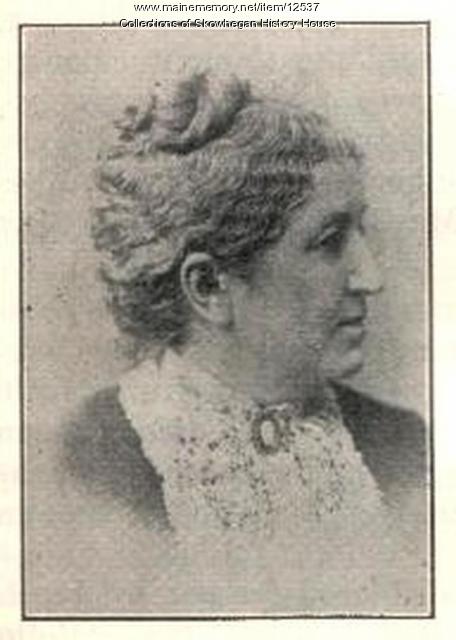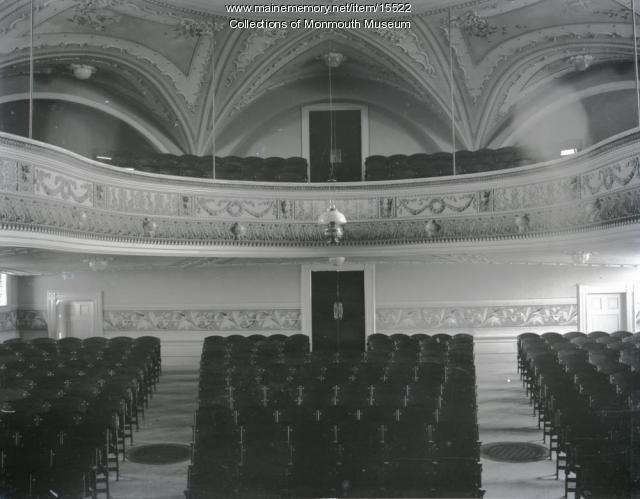Keywords: lecture
- Historical Items (100)
- Tax Records (0)
- Architecture & Landscape (0)
- Online Exhibits (35)
- Site Pages (32)
- My Maine Stories (6)
- Lesson Plans (0)
Online Exhibits
Your results include these online exhibits. You also can view all of the site's exhibits, view a timeline of selected events in Maine History, and learn how to create your own exhibit. See featured exhibits or create your own exhibit
Exhibit
The Schooner Bowdoin: Ninety Years of Seagoing History
After traveling to the Arctic with Robert E. Peary, Donald B. MacMillan (1874-1970), an explorer, researcher, and lecturer, helped design his own vessel for Arctic exploration, the schooner <em>Bowdoin,</em> which he named after his alma mater. The schooner remains on the seas.
Exhibit
Maine's Untold Vegetarian History
Vegetarianism has deep roots in Maine and this first-of-its-kind exhibition explores this untold story.
Exhibit
Student Exhibit: Rebecca Sophie Clarke
Sophie May, whose real name was Rebecca Clarke, was the author of over 40 books between 1861 and 1903. She wrote the "Little Prudy Series" based on the little town of Norridgewock.
Exhibit
Mainers, like residents of other states, had differing views about slavery and abolition in the early to mid decades of the 19th century. Religion and economic factors were among the considerations in determining people's leanings.
Exhibit
Fair Season: Crops, Livestock, and Entertainment
Agricultural fairs, intended to promote new techniques and better farming methods, have been held since the early 19th century. Before long, entertainments were added to the educational focus of the early fairs.
Exhibit
Rum, Riot, and Reform - Acknowledgements
"Opening Reception Acadia Trust N.A./Gouws Capital Lecture Series Lincoln National Life Insurance Co."
Exhibit
Bowdoin College Scientific Expedition to Labrador
"The Bowdoin Boys" -- some students and recent graduates -- traveled to Labrador in 1891 to collect artifacts, specimens, and to try to find Grand Falls, a waterfall deep in Labrador's interior.
Exhibit
Capturing Arts and Artists in the 1930s
Emmie Bailey Whitney of the Lewiston Journal Saturday Magazine and her husband, noted amateur photographer G. Herbert Whitney, captured in words and photographs the richness of Maine's arts scene during the Great Depression.
Exhibit
Public education has been a part of Maine since Euro-American settlement began to stabilize in the early eighteenth century. But not until the end of the nineteenth century was public education really compulsory in Maine.
Exhibit
Westbrook Seminary: Educating Women
Westbrook Seminary, built on Stevens Plain in 1831, was founded to educate young men and young women. Seminaries traditionally were a form of advanced secondary education. Westbrook Seminary served an important function in admitting women students, for whom education was less available in the early and mid nineteenth century.
Exhibit
The Advent of Green Acre, A Baha'i Center of Learning
The Green Acre Baha'i School began as Green Acre Conferences, established by Sarah Jane Farmer in Eliot. She later became part of the Baha'i Faith and hosted speakers and programs that promoted peace. In 1912, the leader of the Baha'i Faith, 'Abdu'l-Baha, visited Green Acre, where hundreds saw him speak.
Exhibit
Rum, Riot, and Reform - Politics and Enforcement
"… Society Francis Murphy gave his first temperance lecture in Portland on April 3, 1870 and soon became a powerful voice. He was allied with Dr."
Exhibit
Maine has some 17 million acres of forest land. But even on a smaller, more local scale, trees have been an important part of the landscape. In many communities, tree-lined commercial and residential streets are a dominant feature of photographs of the communities.
Exhibit
A Celebration of Skilled Artisans
The Maine Charitable Mechanic Association, an organization formed to promote and support skilled craftsmen, celebrated civic pride and members' trades with a parade through Portland on Oct. 8, 1841 at which they displayed 17 painted linen banners with graphic and textual representations of the artisans' skills.
Exhibit
Music in Maine - Opera, Orchestras and Stages
"Opera houses hosted lectures, plays, live music, and movies, with many hosting actual operas, such as The Merry Widow in Lewiston and Faust in…"
Exhibit
Graduations -- and schools -- in the 19th through the first decade of the 20th century often were small affairs and sometimes featured student presentations that demonstrated what they had learned. They were not necessarily held in May or June, what later became the standard "end of the school year."
Exhibit
The National Federation of Business and Professional Women's Clubs (NFBPWC) held their seventh annual convention in Portland during July 12 to July 18, 1925. Over 2,000 working women from around the country visited the city.
Exhibit
Like many cities in France, Lewiston and Auburn's skylines are dominated by a cathedral-like structure, St. Peter and Paul Church. Now designated a basilica by the Vatican, it stands as a symbol of French Catholic contributions to the State of Maine.
Exhibit
A Brief History of Colby College
Colby originated in 1813 as Maine Literary and Theological Institution and is now a small private liberal arts college of about 1,800 students. A timeline of the history and development of Colby College from 1813 until the present.
Exhibit
Promoting Rockland Through a Stereopticon, 1875
Frank Crockett and photographer J.P. Armbrust took stereo views of Rockland's downtown, industry, and notable homes in the 1870s as a way to promote tourism to the town.
Exhibit
Chansonetta Stanley Emmons: Staging the Past
Chansonetta Stanley Emmons (1858-1937) of Kingfield, Maine, experimented with the burgeoning artform of photography. Starting in 1897, Emmons documented the lives of people, many in rural and agricultural regions in Maine and around the world. Often described as recalling a bygone era, this exhibition features glass plate negatives and painted lantern slides from the collections of the Stanley Museum in Kingfield on deposit at Maine Historical Society, that present a time of rapid change, from 1897 to 1926.
Exhibit
These stories -- that stretch from 1999 back to 1759 -- take you from an amusement park to the halls of Congress. There are inventors, artists, showmen, a railway agent, a man whose civic endeavors helped shape Portland, a man devoted to the pursuit of peace and one known for his military exploits, Maine's first novelist, a woman who recorded everyday life in detail, and an Indian who survived a British attack.
Exhibit
Sugar and Spice: Our Vintage Recipes
Sugar and Spice: Our Vintage Recipes showcases historic recipes, dating from the 18th century to the 1950s, like sweet treats, traditional favorites, promotional printings, medicinal concoctions, curious libations, and recipes that have fallen out of favor.
Exhibit
CODE RED: Climate, Justice & Natural History Collections
Explore topics around climate change by reuniting collections from one of the nation's earliest natural history museums, the Portland Society of Natural History. The exhibition focuses on how museums collect, and the role of humans in creating changes in society, climate, and biodiversity.
























